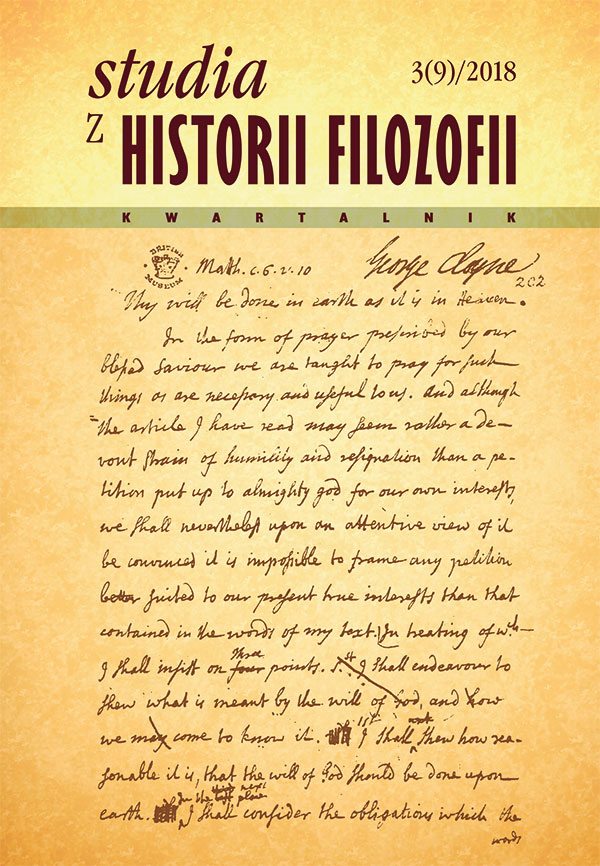Leibniz i jego Bóg. Rozważania z Voltaire’em w tle
DOI:
https://doi.org/10.12775/szhf.2018.031Schlagworte
Leibniz, Voltaire, Bóg, zasada racji dostatecznej, zasada niesprzecznościAbstract
Leibniz był wielkim filozofem, o czym świadczy stworzony przez niego wielki system filozoficzny. Podstawą tego systemu jest Bóg, a punktem wyjścia dwie zasady: racji dostatecznej i niesprzeczności. Za pomocą tych dwu zasad Leibniz stwarza swego Boga – wiecznego i niezmiennego jak one, zdeterminowanego nimi i działającego w ich ramach. Leibniz stworzył Boga na obraz i podobieństwo własnego umysłu – Bóg ten posiada w stopniu nieskończonym wszystkie i tylko te właściwości, które posiada umysł Leibniza. Staje się to widoczne w świetle krytyki dokonanej przez Voltaire’a. Logicznemu pojęciu Leibnizowskiego Boga przeciwstawił Voltaire swoje własne odczucie niemożności zrozumienia sensu ludzkiej egzystencji, doświadczenie ograniczoności ludzkiego rozumu. Bóg Leibniza jest na miarę genialnego umysłu filozofa; Voltaire nie jest zdolny pojąć tego Boga, ponieważ ma tylko zwyczajny, ludzki umysł. Bóg Leibniza to twór genialnego umysłu wielkiego filozofa – idea zawierająca w swej treści wszystkie doskonałości, której jednak nie przysługuje realne istnienie.
Literaturhinweise
Acta Eruditorum anno MDCCXXVIII publicata, Lipsiae: Typis Bernhardi Christoph. Breitkopfii, 1728.
Adams Robert, Merrihew. 1994. Leibniz. Determinist, Theist, Idealist, New York – Oxford: Oxford University Press.
Baczko Bronisław, red. 1961. Filozofia francuskiego Oświecenia. Warszawa: PWN.
Boutroux Émile. 1880. Notice sur la vie et la philosophie de Leibnitz. W: Leibnitz. La Monadologie. Paris: Delagrave.
Brooks Richard, A. 1964. Voltaire and Leibniz. Geneve: Librairie Droz.
Cione Edmondo. 1964. Leibniz. Napoli: Libreria Scientifica Editrice.
Clarke Samuel. 1717. A Collection of Papers which passed between the Late Learned Mr. Leibnitz and Dr. Clarke.... London: printed for James Knapton, at the Crown in St. Paul’s Church-Yard.
Descartes René. 1974. Oeuvres, red. Charles Adam i Paul Tannery, Paris: Libraire J. Vrin.
Descartes René. 1958. Medytacje o pierwszej filozofii, tłum. Maria i Kazimierz Ajdukiewiczowie i in. Warszawa: PWN.
Descartes René. 2005. Zarzuty i odpowiedzi późniejsze, tłum. Jerzy Kopania. Kęty: Wydawnictwo Antyk.
Gilson Étienne. 1982. Bóg i filozofia, tłum. Maria Kochanowska. Warszawa: Pax.
Gordon Mieczysław. 1974. Leibniz. Warszawa: Wiedza Powszechna.
Gordon Mieczysław. 1985. „O krytyce przez Leibniza kartezjańskiej wersji dualizmu”. Studia Philosophiae Christianae 21 (1): 23–38.
Grover Stephen. 1996. “West Or Best? Sufficient Reason in the Leibniz-Clarke Correspondence”. Studia Leibnitiana 28 (1): 84–92.
Guitton Jean. 1973. Profile, tłum. Ada Borkowska-Szuba, Stanisław Cichowicz, Wanda Sukiennicka. Warszawa: Instytut Wydawniczy Pax.
Guhrauer Gottschalk Eduard. 1842. Gottfried Wilhelm, Freiherr v. Leibnitz. Eine Biographie. Breslau: Hirt; reprint: Hildesheim: Olms 1966.
Kołakowski Leszek. 1988. Jeśli Boga nie ma, tłum. Tadeusz Baszniak i Maciej Panufnik. Kraków: Wydawnictwo Znak.
Krauze-Błachowicz Krystyna. 1992. Leibniz. Wczesne pojęcie substancji. Białystok: Zakład Teorii Poznania. Filia Uniwersytetu Warszawskiego.
Leibniz Gottfried Wilhelm. 1890. Dialogus. W: Carl Immanuel Gerhardt, red. Die Philosophischen Schriften von G. W. Leibniz. T. VII. Berlin: Weidmann.
Leibniz Gottfried Wilhelm. 1955. Nowe rozważania dotyczące rozumu ludzkiego, tłum. Izydora Dąmbska. Warszawa: PWN.
Leibniz Gottfried Wilhelm. 1969. Zasady filozofii, czyli monadologia, tłum. Stanisław Cichowicz. W: Gottfried Wilhelm Leibniz, Wyznanie wiary filozofa. Rozprawa Metafizyczna. Monadologia. Zasady natury i łaski oraz inne pisma filozoficzne, tłum. Stanisław Cichowicz, Juliusz Domański, Henryk Krzeczkowski, Henryk Moese, oprac. Stanisław Cichowicz. Warszawa: PWN.
Leibniz Gottfried Wilhelm. 1969. Wyznanie wiary filozofa, tłum. Juliusz Domański. W: Gottfried Wilhelm Leibniz, Wyznanie wiary filozofa. Rozprawa Metafizyczna. Monadologia. Zasady natury i łaski oraz inne pisma filozoficzne, tłum. Stanisław Cichowicz, Juliusz Domański, Henryk Krzeczkowski, Henryk Moese, oprac. Stanisław Cichowicz. Warszawa: PWN.
Leibniz Gottfried Wilhelm. 1994. Pisma z teologii mistycznej, tłum. Małgorzata Frankiewicz. Kraków: Wydawnictwo Znak.
Leibniz Gottfried Wilhelm. 2014. „Rozprawa metafizyczna o zasadzie indywiduacji”, tłum. Tomasz Gliński, Studia z Historii Filozofii 5 (3): 35–51. Leibniz Gottfried Wilhelm. 2001. Teodycea, tłum. Małgorzata Frankiewicz. Warszawa: PWN.
Lovejoy Arthur Oncken. 1999. Wielki łańcuch bytu. Studium z dziejów idei, tłum. Artur Przybysławski. Warszawa: Wydawnictwo KR.
Mackie John Milton. 1845. Life of Godfrey William von Leibnitz; on the basis of the German work of Dr. G. E. Guhrauer. Boston: Gould, Kendall and Lincoln. (Przedruki późniejsze: Kessinger Publishing, 2007 i Leopold Classic Library, 2015.)
Mates Benson. 1986. The Philosophy of Leibniz. Metaphysics and Language. New York – Oxford: Oxford University Press.
Mathieu Vittorio. 1994. Saggiointroduttivo. La conciliazione di ragione e fede punto culminante della reflessione leibniziana. W: Leibniz, Saggi di teodicea. Cinisello Balsamo (Milano): Edizioni San Paolo.
Mercer Christia. 2006. “Leibniz on Mathematics, Methodology and the Good: A Reconsideration of the Place of Mathematics in Leibniz’s Philosophy”. Early Science and Medicine 11 (4): 424–454.
Mugnai Massimo. 2001. “Leibniz on Individuation: From the Early Years to the „Discourse” and Beyond”. Studia Leibnitiana 33 (1): 35–56.
Poma Andrea. 2013. The Impossibility and Necessity of Theodicy. The “Essais” of Leibniz. Dordrecht: Springer. (Oryginał włoski: Impossibilita e necessita della Teodicea. Gli “Essais”di Leibniz, Mursia 1995.)
Popkin Richard H. 2003. The History of Scepticism. From Savonarola to Bayle. New York: Oxford University Press.
Recueil de diverses pieces sur la philosophie, la religion naturelle, l’histoire, les mathematiques, etc., par Mrs Leibniz, Clarke, Newton et autres autheurs célebres, t. I i II. Amsterdam: Duvillard et Changuion 1720 (wyd. 2: 1740).
Russell Bertrand. 2000. Dzieje filozofii Zachodu, tłum. Adam Lipszyc, Tadeusz Baszniak i inni. Warszawa: Fundacja Aletheia.
Stewart Matthew. 2006. The Courtier and the Heretic. Leibniz, Spinoza, and the Fate of God in the Modern World. New York – London: W. W. Norton & Company.
Tomasz z Akwinu. Quaestiones disputatae de potentia Dei. W: S. Thomae Aquinatis, Opera Omnia. T. 8. Parmae: P. Fiaccadori 1852–1873.
Wittgenstein Ludwig. 1970. Tractatus logico-philosophicus, tłum. Bogusław Wolniewicz. Warszawa: PWN. Voltaire. 1954. Dictionnaire philosophique. Paris: Éditions Garnier Freres.
Voltaire. 1956. Elementy filozofii Newtona, tłum. Helena Konczewska. Warszawa: PWN.
Voltaire. 2009. Le philosophe ignorant. Paris: Éditions Flammarion.
Voltaire. 2015. Słownik filozoficzny, tłum. Marian Skrzypek. Warszawa: Fundacja Augusta hr. Cieszkowskiego.
Wolter. 1994. Pamiętniki, tłum. Stanisław Fiszer. Warszawa: Książka i Wiedza.
Yakira Elhanan. 2012. “Time and Space, Science and Philosophy in Leibniz-Clarke Correspondence”, Studia Leibnitiana 44 (1): 14–32.
Downloads
Veröffentlicht
Zitationsvorschlag
Ausgabe
Rubrik
Stats
Number of views and downloads: 2580
Number of citations: 0



